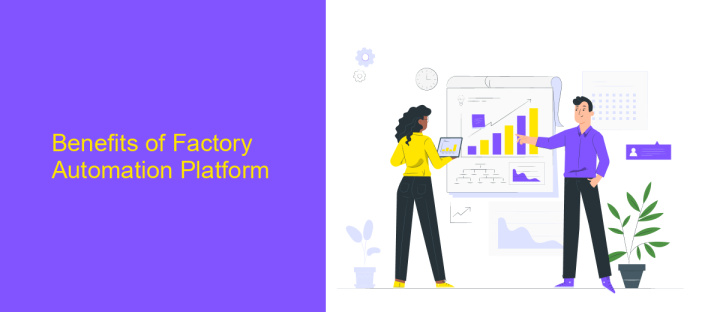Factory Automation Platform
In today's rapidly evolving industrial landscape, the integration of factory automation platforms has become essential for enhancing efficiency and productivity. These platforms serve as the backbone of smart manufacturing, enabling seamless communication between machines, systems, and humans. By leveraging advanced technologies such as IoT, AI, and robotics, factory automation platforms empower businesses to streamline operations, reduce costs, and maintain a competitive edge in the global market.
Introduction to Factory Automation Platform
Factory automation platforms are revolutionizing the manufacturing industry by integrating advanced technologies to streamline operations and enhance productivity. These platforms provide a comprehensive solution that enables manufacturers to automate processes, monitor equipment, and optimize production lines. By leveraging the power of data analytics and real-time monitoring, factory automation platforms facilitate improved decision-making and increased operational efficiency.
- Seamless integration of IoT devices and sensors
- Real-time data collection and analysis
- Enhanced predictive maintenance capabilities
- Scalable solutions for diverse manufacturing needs
- Improved quality control and reduced downtime
Implementing a factory automation platform empowers businesses to stay competitive in a rapidly evolving market. By automating routine tasks and providing valuable insights into production processes, these platforms help manufacturers reduce costs and improve product quality. As technology continues to advance, the adoption of factory automation platforms is set to become increasingly essential for companies aiming to achieve sustainable growth and operational excellence.
Benefits of Factory Automation Platform

Implementing a Factory Automation Platform significantly enhances operational efficiency by streamlining processes and reducing human error. Automation allows for consistent and precise execution of tasks, which leads to improved product quality and faster production times. This consistency not only boosts productivity but also ensures better compliance with industry standards. Moreover, the platform's ability to collect and analyze data in real-time enables manufacturers to make informed decisions, optimizing resource allocation and minimizing downtime.
Another key benefit is the seamless integration of various systems and processes within the factory. Utilizing services like ApiX-Drive, businesses can easily connect disparate systems, allowing for smooth data flow and communication between machines and software. This integration capability reduces the complexity of managing multiple platforms and enhances the overall scalability of operations. Additionally, the platform's adaptability to new technologies means factories can stay ahead of industry trends, ensuring long-term competitiveness and sustainability in a rapidly evolving market.
Key Features of Factory Automation Platform

Factory Automation Platforms are revolutionizing modern manufacturing by streamlining processes and enhancing productivity. These platforms integrate various technologies to provide a cohesive system that automates tasks, reduces errors, and improves efficiency. With the increasing demand for smart manufacturing solutions, understanding the key features of such platforms is crucial for businesses looking to stay competitive.
- Real-time Monitoring: Enables continuous tracking of production processes, allowing for immediate adjustments and minimizing downtime.
- Scalability: Easily adaptable to accommodate growth and changing production demands without significant overhauls.
- Interoperability: Seamlessly integrates with existing machinery and software, ensuring smooth operations across different systems.
- Data Analytics: Provides valuable insights through data collection and analysis, facilitating informed decision-making.
- Predictive Maintenance: Anticipates equipment failures before they occur, reducing maintenance costs and preventing unexpected breakdowns.
These features collectively enhance the operational efficiency of manufacturing facilities, ensuring that they remain agile and responsive to market changes. By leveraging such advanced platforms, manufacturers can not only optimize their current processes but also pave the way for future innovations. Embracing factory automation is not just about keeping up with industry trends; it's about setting new standards in manufacturing excellence.
Applications of Factory Automation Platform

Factory automation platforms are revolutionizing industrial operations by streamlining processes and enhancing productivity. These platforms integrate various technologies, such as IoT, AI, and robotics, to create a cohesive system that optimizes manufacturing workflows. By automating repetitive tasks, companies can reduce human error, increase efficiency, and lower operational costs.
One of the primary applications of factory automation platforms is in assembly lines, where precision and speed are crucial. These platforms enable real-time monitoring and control, ensuring that each component is assembled accurately and efficiently. Additionally, they facilitate predictive maintenance, reducing downtime and extending equipment lifespan.
- Quality control: Automation platforms ensure consistent product quality through advanced sensors and analytics.
- Inventory management: They provide real-time data on stock levels, optimizing supply chain operations.
- Energy management: These systems monitor energy consumption, promoting sustainability and cost savings.
- Safety enhancements: Automation reduces workplace hazards by minimizing human involvement in dangerous tasks.
In conclusion, factory automation platforms are pivotal in modernizing manufacturing industries. By leveraging cutting-edge technologies, they not only improve operational efficiency but also contribute to sustainable and safe industrial practices. As these platforms evolve, they will continue to shape the future of manufacturing, driving innovation and competitiveness.
- Automate the work of an online store or landing
- Empower through integration
- Don't spend money on programmers and integrators
- Save time by automating routine tasks
Conclusion
In conclusion, the implementation of a Factory Automation Platform represents a transformative step towards enhancing operational efficiency and productivity in industrial settings. By automating repetitive tasks and integrating advanced technologies, factories can significantly reduce human error, optimize resource allocation, and increase throughput. This paradigm shift not only improves the bottom line but also fosters a safer and more sustainable working environment. As industries continue to evolve, the adoption of such platforms will become increasingly crucial to maintaining competitive advantage.
Moreover, the seamless integration of various systems is vital for the success of automation initiatives. Services like ApiX-Drive play a pivotal role in facilitating these integrations, allowing different software and hardware components to communicate effectively. By leveraging such tools, businesses can ensure that their automation strategies are both comprehensive and adaptable to future technological advancements. Ultimately, embracing a Factory Automation Platform, supported by robust integration solutions, paves the way for smarter, more agile manufacturing processes that are well-equipped to meet the demands of the modern market.
FAQ
What is a Factory Automation Platform?
How does a Factory Automation Platform improve productivity?
What are the key components of a Factory Automation Platform?
How can I integrate existing systems with a Factory Automation Platform?
What are the benefits of using a Factory Automation Platform?
Time is the most valuable resource for business today. Almost half of it is wasted on routine tasks. Your employees are constantly forced to perform monotonous tasks that are difficult to classify as important and specialized. You can leave everything as it is by hiring additional employees, or you can automate most of the business processes using the ApiX-Drive online connector to get rid of unnecessary time and money expenses once and for all. The choice is yours!


